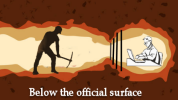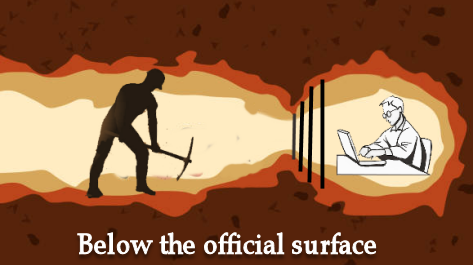 Recent reading of Christine Steenkamp's article about tunnels and conflicts in the Middle East[1] made me think again about open-source, independent media, hacking, viruses, free speech and freedom of information, in a different way. And to connect what is happening with Julian Assange with what is happening in Gaza. Not just in so far as Julian Assange’s Wikileaks, if it were operating with him still in command, would tell us a lot about these wars and might have prevented them, but because Wikileaks and whistleblowers use secret conduits or tunnels to create new spaces outside the State, in a similar manner to secret tunnel systems used in warfare or used in parallel economic systems to official state ones. (See also, "War, peace, treasure and tradition: tunnels and cave systems in 21st C Levant.")
Recent reading of Christine Steenkamp's article about tunnels and conflicts in the Middle East[1] made me think again about open-source, independent media, hacking, viruses, free speech and freedom of information, in a different way. And to connect what is happening with Julian Assange with what is happening in Gaza. Not just in so far as Julian Assange’s Wikileaks, if it were operating with him still in command, would tell us a lot about these wars and might have prevented them, but because Wikileaks and whistleblowers use secret conduits or tunnels to create new spaces outside the State, in a similar manner to secret tunnel systems used in warfare or used in parallel economic systems to official state ones. (See also, "War, peace, treasure and tradition: tunnels and cave systems in 21st C Levant.")
 Steenkamp’s 2022 article, “The impact of tunnels on conflicts in the Middle East,” in International Affairs, described real multi-level systems, especially in the Middle East, and how they can really exist, endure, and prosper, as alternatives to official systems – political, economic, state, demographic, urban, supply - during conflicts and between conflicts, as systems that exist despite lines drawn on the map on the surface. Her descriptions covered enough potentials to be inspiring, and to explain the survival of peoples persecuted by apparently massively superior powerful states, in situations that seemed, on the surface, to be hopeless.
Steenkamp’s 2022 article, “The impact of tunnels on conflicts in the Middle East,” in International Affairs, described real multi-level systems, especially in the Middle East, and how they can really exist, endure, and prosper, as alternatives to official systems – political, economic, state, demographic, urban, supply - during conflicts and between conflicts, as systems that exist despite lines drawn on the map on the surface. Her descriptions covered enough potentials to be inspiring, and to explain the survival of peoples persecuted by apparently massively superior powerful states, in situations that seemed, on the surface, to be hopeless.
And that made me think about how peoples’ perception of reality and what is important is dominated by state and corporate media narrative, both ‘legacy’ and on line. This is the media that manufactures consent whilst purporting to reflect public opinion, represents states, and seems to have a stranglehold on our personal information and capacity to affect it and, in some cases, to organize against it.
But Steenkamp conjures up a world where ordinary people, among the poorest and most disempowered, go under and around and through the state borders officially demarcated on the surface.
It would be very hard to dig secret tunnels in Australia because we are atomized and anything we do in terms of urban engineering requires permission from the powerful and distant, rather than from neighbours and relatives. However, in countries where people are still organized at the level of clans and villages, even within cities, brothers, sisters, and neighbours, can engineer underground systems, using hand-tools or industrial machines.
And, in cyberspace, technology is still in the hands of individuals, although there is an increasingly costly (financially and technically) system of rules being built up that limits individual capacity to build and maintain web-systems. At the moment, Julian Assange, who built tunnels in cyberspace, has been imprisoned by powerful official states, within concrete and steel walls, and kept away from the internet.
On the surface, it seems hopeless, especially since successive generations have less and less deep knowledge of computer language, but study it in proprietary pre-assembled lego-like bits, which are sold in parcels, and highly controlled.
Despite all such attempts to make the rules and dominate, by state and corporate actors, there will always be people who can adapt those systems and that technology for freedom. To understand this, you have to envisage political power-systems as multilayered, just like cave-systems, with above-ground and underground connections, and with official and unofficial entrances, exits, and connections.
NOTES
[1] Christina Steenkamp, “The impact of tunnels on conflicts in the Middle East,” International Affairs 98: 2, 2022

Add comment